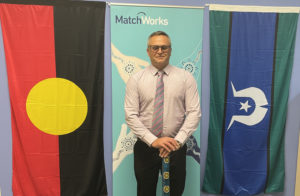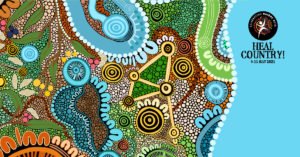“I’ve achieved my career goals.” Graeme’s story.
After moving back to New South Wales from the Kimberley due to family responsibilities, Indigenous job seeker Graeme has overcome personal and professional barriers to land his ideal job as a Case Worker at Family Coast Support.
Early years of trauma
Graeme was around violence from a young age. “It’s easy to see now how violence becomes a repeated cycle from father to son,” Graeme said. “After that trauma, alcohol became my roundabout of misery and it even led me to a stint in jail. I wanted to stay sober, so I decided to leave my friends, and everything I knew, and pack my meagre belongings to travel around Australia doing farm work.”
Graeme progressed from labouring to managing the farm hands. “Not drinking helped me to manage financially, and I began to heal from the traumas of my past which led me to coordinating a men’s prevention and intervention program in the Kimberley,” Graeme said.
In this year-long role, Graeme helped the community engage with support and rehabilitation services at record levels, winning awards along the way.
“We supported people during domestic violence incidents and helped to keep people out of jail and succeed in rehab. All the while, I mentored a fellow Aboriginal man who took over the program when I had to return to New South Wales. The local community really took positive control of the community which is what we wanted.”
Barriers to overcome
Back in New South Wales to be closer to family, Graeme took on odd handyman jobs. He grew his own fruit and vegetables and fished to make ends meet. He also met with the MatchWorks team including Employer Solutions Consultant, Susie Binns.
“At other agencies, I had been treated like a KPI, but Susie and the team at MatchWorks listened to what I was telling them,” Graeme said. “I was supported in whatever avenue I wanted to follow, and I was offered help for anything I might need.”
“Graeme had life and professional experience, but his criminal history was a barrier,” Susie said.
“I can understand that because it’s not often that people change their behaviour,” Graeme said. “It was a matter of finding an employer that was accepting of my past and supportive of my future.”
The MatchWorks team supported Graeme with:
• Tailored support.
• An opportunity to be part of MatchWorks Deadly Yakka program.
• Finding a supportive employer.

Graham after his makeover during the Deadly Yakka Central Coast program.
“Deadly Yakka was awesome,” Graeme said. “I owe a big thank you to everyone involved with it – Susie, Lisa, Alison, Glenn, Teena and Jeff, and within three weeks I had landed the exact job I was looking for. I wouldn’t have been able to connect with this employer if it wasn’t for the program and the team at MatchWorks.”
“I’m still in contact with some of the other participants, so I broadened my social network too. I can call them up for a yarn and they’re like-minded, so I don’t have to worry about drinking with them.”
“Now that I’m working, I can afford to upgrade from where I’m living, and stay close to my family.”
Find out more about our employment services for Indigenous job seekers or Indigenous recruitment services. Or call 1300 13 23 63 to chat to your local team.

It’s NAIDOC Week 4 – 11 July, a time to celebrate the history, culture and achievements of Aboriginal and Torres Strait Islander peoples. This years theme is Heal Country! It calls for stronger measures to recognise, protect, and maintain all aspects of Aboriginal and Torres Strait Islander culture and heritage.